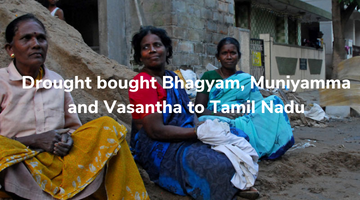Drought bought Bhagyam, Muniyamma and Vasantha to Tamil Nadu
- Home
- Recent blogs

The lack of rain in Tamil Nadu brought Bhagyam, Muniyamma and Vasantha (from left to right) to Bangalore in search of work. Muniyamma becomes my mediator, using her bilingual skills to translate from Kannada-Tamil-Kannada. I’m thankful for this, as it means that I don’t have to find a common sign-language, interspersed with a few words that may vaguely sound like Tamil, or have the man (extreme right) translate for me, because his advice is “bas idea se likh do, ho jayega kaam”.
Muniyamma, close to being five decades old, used to tie flowers for a living until three months ago, when she began construction work. She educated her three daughters till at least the 8th std. before taking loans to get them married; she continues to educate her lone son. Her hope for the days to come is that they are all happy and well, and that the son is married, but she says that her husband’s alcoholism is the source of a daily dose of tension: “He comes home every night to have drunken fights that only last ten minutes because he falls asleep soon after” she explains, mocking him for being unable to fight for longer. She exudes a resilience that seems to help her soldier on, carrying a sense of humour accompanied by a hearty laugh.
In contrast to this, Bhagyam’s voice is heavy with a sense of defeat. She too has an abusive-alcoholic husband. Muniyamma translates this for me and adds jokingly that she would kill herself if her husband hit her! I have a hard time understanding what is funny, so she repeats herself several times for my benefit.
Bhagyam’s son, who is now married, began to follow in his father’s footsteps early and started drinking when he was in class 6 only.
She also has four daughters- three of whom are married, one who has taken up a teacher-training course, which exerts additional pressure on Bhagyam’s already strained finances. ‘There is land’ she explains, as though discussing solutions to her money crunch with me, ‘but it is disputed between brothers’.
“How do we do well?”, she asks. She can only see grey days in her worry-shrouded future.
Luck, happiness, or whatever else it is that makes for a good life favour Vasantha more than Muniyamma or Bhagyam. A good ten years younger than the latter two, Vasantha says that she has no troubles, she is quite happy. Her marriage, devoid of alcoholism and drunken abuse, is no cause for complaint. In fact, according to Muniyamma, Vasantha is the one who intimidates her husband! Vasantha laughs in agreement.
Mother to four sons, three of whom are married, she awaits January when the fourth one will also be married. Foreseeing an end to her responsibility after her last child’s wedding, she says she will be very happy and only stay at home, adding that they took a loan to build it.
“So you have a house in Tamil Nadu?” I ask, wanting to know more about their living conditions.
“Yes! Houses like these!” she exclaims, pointing to robustly built concrete structures.
Much to my surprise, they all own independent houses; my conception of construction workers as modern-day gypsies fades.
“Don’t you feel like staying at home then?” I ask, slightly puzzled by the choice of tarpaulin tents over permanent buildings.
Of course they want to live in their own homes, they tell me.
“But it’s a village. How do we earn? That’s why we come here, live in sheds and get bitten by mosquitos all night long.”
It is not much of a choice, really.